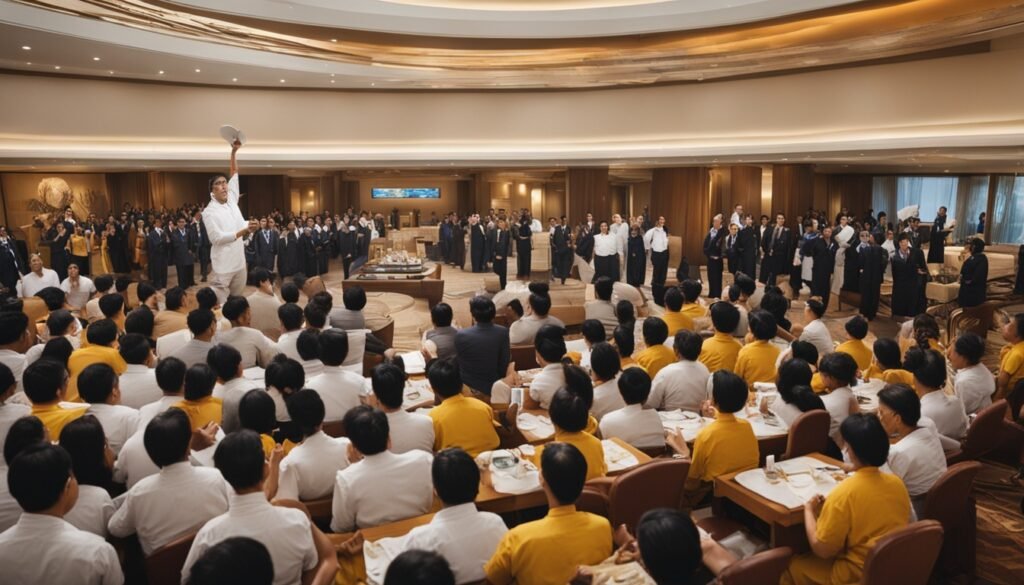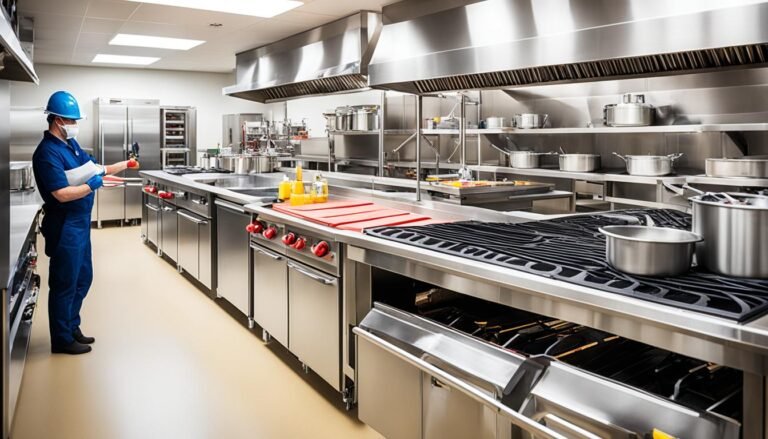Navigating Crisis Management in Hospitality
It’s a sunny day at a busy hotel by the coast. The lobby is packed with guests, and the restaurant hums with activity. The pool echoes with the sounds of fun. But then, the weather changes. Dark clouds appear, thunder echoes, and rain falls hard. In a short time, a perfect holiday turns into a crisis for the hotel.
This story shows how hospitality faces unexpected challenges. Crises vary from natural disasters to pandemics, from financial stress to damaged reputation. Hotels and resorts need to be ready for anything. Dealing with crises is vital for their reputation, work, and financial health.
This article will look at why crisis management in hospitality matters. We’ll talk about how to handle different emergencies effectively. This includes creating detailed crisis management plans, doing risk checks, and planning steps to lessen harm. Plus, we’ll discuss how to communicate in a crisis, and the importance of training and practice.
Key Takeaways:
- Crisis management is crucial for safeguarding the reputation, operations, and financial stability of hospitality businesses.
- The hospitality industry faces various crises, including natural disasters and pandemics.
- It calls for strategic planning, clear communication, and taking quick, smart actions.
- To handle crises, having a solid plan, doing risk checks, and being flexible are key.
- Learning from past crises, listening to experts, and always getting better at crisis management makes a business stronger.
Examples of Crises in the Hospitality Industry
The hospitality industry is always moving. It faces many crises, causing chaos and serious problems for hotels and resorts. Let’s look at some common types of crises:
1. Financial Crises
In tough economic times, hotels can struggle to make money. When there are fewer guests, less money comes in, and costs go up. This puts a big pressure on a hotel’s finances.
2. Safety and Security Incidents
Accidents at the pool or thefts can be dangerous and harm the hotel’s name. It’s important to have quick and effective plans to keep everyone safe.
3. Global Pandemics
The recent COVID-19 pandemic has shown how global health issues hit the hospitality industry hard. Hotels and resorts have had to make big changes to stay safe and follow health rules.
4. Reputational Crises
Bad media or online reviews can quickly ruin a hotel’s reputation. Tackling these issues fast with clear communication and action is key to turning things around.
5. “Peter Principle” Crises
Putting employees in jobs they can’t handle well can cause a lot of problems. It’s important to fix these issues by looking at who does what and making changes.
6. Natural Disasters
Hotels in disaster-prone areas must be ready with plans to evacuate and respond to emergencies. This is crucial for keeping guests and staff safe.
7. Loss of Key Personnel
When important staff leave suddenly, it can shake up the hotel’s day-to-day work. Making sure there’s a plan for new leaders is essential to keep things going.
8. Technological Failures
Failing tech, like booking systems or network connections, can stop a hotel from running smoothly. Hotels need backup plans and quick IT help to avoid service problems.
9. Infrastructure Crises
Broken infrastructure, like lights or plumbing, can make guest stays unpleasant or unsafe. Fast maintenance and fixes are needed for these situations.
10. Labor Strikes
Labor issues can stop hotel work and upset guests. Good talk, negotiation, and happy employee relations can soften the impact of these strikes.
The hospitality world is always changing. To survive, hotels and resorts need solid plans for any crisis. They need to be ready to act, keep guests happy, and protect their good name.
Approaches to Crisis Management in Hospitality
Being ready for a crisis in hospitality means covering all bases. It’s not enough to have a plan; it must be detailed to work in every situation. The key is to act fast and effectively when problems come up. These methods will help:
1. Crisis Management Plan
A solid crisis plan is essential for the hospitality industry. It should detail steps for every crisis type and who does what. Important parts are figuring out risks, how to talk to people, and making sure everyone is trained.
2. Risk Assessment and Mitigation
To keep things safe, the hospitality sector must always check for risks and find ways to reduce them. This means hotels and other places know what might go wrong and how to stop big problems before they start.
3. Crisis Management Experts
Getting help from people who deal with crises every day can make a big difference. These experts know how to keep calm, steer the response, and give advice based on what works best.
4. Crisis Communication Strategy
Knowing how to talk during a crisis is key. This part is about choosing who speaks, having clear ways to share information, and always being open and honest. Good communication keeps trust alive.
5. Training and Drills
Practice makes perfect, especially when it comes to handling emergencies. Staff need to know what to do, and training and drills are the best way to get them ready. This makes sure that when trouble comes, everyone is on the same page.
6. Flexibility and Adaptability
Crises can change everything fast. Being flexible lets hospitality groups switch up how they work and use what they have in different ways. This keeps them ready for any surprise and focused on keeping people safe and supported.
7. Guest and Employee Support
Keeping everyone safe and informed is top priority during crises. It means taking care of guests and making sure workers have what they need, like support and resources, for their safety and peace of mind.
8. Learning from Past Crises
One of the best ways to get better at handling problems is to look back at what’s happened before. By learning from past mistakes and successes, organizations can improve how they manage crises and get stronger for the future.
By combining the right strategies, the hospitality field is better equipped to deal with crises. This way, risks are lower, and everyone, from guests to employees, can feel supported.
| Approach | Description |
|---|---|
| Crisis Management Plan | A comprehensive plan that outlines procedures, roles, and responsibilities for managing crises in the hospitality industry. |
| Risk Assessment and Mitigation | The process of identifying potential risks and implementing measures to minimize their impact on the business. |
| Crisis Management Experts | Bringing in external professionals with expertise in crisis management to provide guidance and leadership during crises. |
| Crisis Communication Strategy | A well-defined strategy for transparent and timely communication with guests, employees, and other stakeholders during crises. |
| Training and Drills | Regular training sessions and drills to ensure staff are prepared to respond effectively during crises. |
| Flexibility and Adaptability | The ability to adjust operations, reallocate resources, and adapt services to meet the changing demands during crises. |
| Guest and Employee Support | Providing necessary support, resources, and assistance to guests and employees during crises. |
| Learning from Past Crises | Analyze past crises to identify areas for improvement and implement lessons learned for future crisis management strategies. |
Comprehensive Crisis Management Plan
Creating a solid crisis management plan is vital for the hospitality industry. This plan is the core for handling any crisis. It details steps to take, sets up a clear command structure, and assigns roles to team members.
This plan needs to be reviewed often to stay helpful. Updates keep it ready for new challenges. By learning from past crises, organizations know better how to handle future ones. This makes them faster and more effective in their responses, protecting their people and business.
Knowing what kinds of crises might come up is a big part of any plan. By predicting things like natural disasters or cyber attacks, plans can be custom-tailored. This means having the right resources ready for each type of crisis.
Another crucial part is making sure everyone knows what they need to do. A clear chain of command means decisions can be made quickly. With roles clearly decided, team members can respond as needed, without confusion.
Well-thought-out crisis plans are key. They spot risks, lay out who’s in charge, and assign tasks clearly.
Training and practice for employees are also key. This makes sure everyone understands the plan and is ready to act. It sharpens their crisis skills and can show areas needing improvement in the plan.
Good communication is also vital. A plan must cover how to talk to both insiders and outsiders in a crisis. This keeps trust levels high.
The table below shows essential parts of a crisis plan using various crisis types, their risks, and team responsibilities as an example:
| Scenario | Potential Risks | Chain of Command | Roles and Responsibilities |
|---|---|---|---|
| Natural disaster (e.g., hurricane) | Property damage, guest and employee safety, service disruption | General Manager > Director of Operations > Department Heads | General Manager: Overall coordination and decision-making Director of Operations: Safety and evacuation protocols Department Heads: Staff and guest communication, guest relocation |
| Reputational crisis | Negative media coverage, social media backlash | Public Relations Manager > Chief Executive Officer | Public Relations Manager: Media relations, crisis messaging Chief Executive Officer: Key spokesperson, strategic decision-making |
| Health emergency | Pandemic, outbreak of contagious disease | Director of Risk Management > Health and Safety Officer | Director of Risk Management: Crisis assessment, resource allocation Health and Safety Officer: Health protocols, employee health monitoring |
All those involved should have easy access to the crisis plan. Regular checking makes sure it stays effective. With a solid and updated plan, the hospitality sector can face any crisis head-on, protecting everyone and their reputation.
Risk Assessment and Mitigation
In the hospitality industry, managing risks is key to keeping everyone safe. Hotels and resorts work hard to identify and handle possible dangers. This way, they keep their guests and staff safe.
Risk assessment means looking closely at problems that could cause serious trouble. This includes checking for things like bad food or issues that might hurt their reputation. By figuring out what could go wrong, these businesses can plan to avoid problems.
Having a backup plan is also very important. These plans show what to do if something bad happens. They make sure the team knows how to react fast and work together towards a solution.
Alongside plans, following safety protocols helps prevent problems. These rules cover things like keeping guests safe and stopping fires. With good safety habits, hotels make sure their places are safe and sound.
Getting the right insurance is also crucial. It helps cover costs if something does go wrong. With the right insurance, businesses can breathe easier and focus on fixing problems quickly.
Example of Risk Assessment and Mitigation Table:
| Risk | Contingency Plan | Safety Protocols | Insurance Coverage |
|---|---|---|---|
| Food contamination | Regular inspections and audits, proper handling and storage | Good hygiene practices, regular sanitation, and food safety training | Product liability insurance, contamination coverage |
| Reputational crises | Online reputation management, swift responses to negative reviews | Media relations protocols, crisis communication training | Reputation insurance, crisis management coverage |
| Natural disasters | Evacuation plans, emergency supplies, designated safe areas | Emergency response drills, weather monitoring systems | Property insurance, business interruption coverage |
By carefully assessing and handling risks, hotels and resorts protect their futures. They prepare with plans, rules, and insurance to face hard times. This way, they can step forward with strength when challenges come.
Bringing in Crisis Management Experts
In tough times, like during a crisis, hospitality places might need extra help. This is when crisis management experts come in. They add to the skills and knowledge of the current team. With tons of experience and a new look at things, they’re a big help.
Experts in crisis management have seen various crises. With their past work, they get what the hospitality industry goes through uniquely. This helps them figure out the situation fast, spot risks, and make plans to lessen the crisis’s blow.
Crisis experts offer a fresh, unbiased view. They’re not caught up in the usual way of thinking. Because of this, they can give advice that’s fair and focused on what’s best for the organization.
They’re also great at leading. In tough times, they can take charge, getting everyone to work together towards fixing things. Their leadership, alongside their knowledge, can help a lot in solving crises.
“Bringing in crisis management experts can significantly enhance an organization’s crisis management capabilities. Their extensive experience, objective perspective, and leadership skills can make a real difference in navigating through challenging situations.”
It’s key to have crisis experts work closely with your team. This mix of outside and inside knowledge helps everyone to work as one. This way, the team can tackle the crisis, using the best from both sides.
| Benefits of Crisis Management Experts |
|---|
| Extensive crisis management experience |
| Objective perspective |
| Strong leadership skills |
| Complement internal expertise |
By teaming up with crisis experts, hotels and others in hospitality can get better at dealing with tough times. Their clear view, ways of leading, and lots of experience can really change things. They help in facing crises well and keep the harm to the business low.
Crisis Communication Strategy

During a crisis, effective communication is crucial in the hospitality industry. Hotels and restaurants need a strong crisis communication plan. This plan ensures they communicate openly with guests, employees, the media, and others. It includes having certain people speak for the company and giving regular updates to keep trust high.
Being clear in crisis management is vital. This approach makes people trust the company more. Also, it helps set proper expectations. When hotels and restaurants share correct, up-to-date info, they can calm worries and stop false stories. This builds trust with everyone from guests to the public.
Choosing the right people to speak for the company is very important. They should be ready to give clear, correct information. These spokespersons make sure communication is smooth and avoids any mix-ups. This way, the company controls what’s being said.
Keeping everyone up-to-date is also key. Regular updates stop worry and keep everyone informed. Hotels and restaurants should tell people about any changes and what they’re doing about the crisis. This open approach shows the company is working hard and values keeping everyone in the know.
“During a crisis, top-notch communication is a must. To keep people’s trust, hotels and restaurants should be clear, have the right people talk, and share updates often.”
Following a clear crisis communication plan is the best way to handle tough times. It focuses on being open, choosing who talks, and staying in touch with news. This way, trust is kept, the right info gets out, and the company stays strong.
| Benefits of a Crisis Communication Strategy | Examples |
|---|---|
| Establishes trust and credibility | Sharing accurate information about a safety incident |
| Addresses concerns and dispels rumors | Communicating transparently during a reputational crisis |
| Centralizes and controls communication | Designating a spokesperson during a natural disaster |
| Keeps stakeholders informed and engaged | Providing regular updates during a global pandemic |
A clear crisis communication strategy is vital for hotels and restaurants. It ensures the company can handle and talk through crises. With focus on clear, honest talks and staying updated, a company can win trust, meet expectations, and protect its image.
Training and Drills
Crisis management training and drills are key for getting hospitality workers ready to act fast and with confidence during tough times. With the right skills and knowledge, companies make sure their people can protect guests, staff, and the business well.
Employees get detailed lessons on what to do in a crisis, like how to talk to each other, where to go, and how to help someone hurt. They also learn how to assist guests and stay calm when things get really busy.
Companies also do drills to practice for real emergencies. They aim to see if their plans work and spot any problems early. By doing these practices, workers feel more ready and sure of what to do in an actual crisis. So, they can react fast and well.
Everyone’s job is made clear during these times, when everyone must work together like a well-oiled machine. This makes for a better and smooth response to any big problems.
“The importance of crisis management training and drills cannot be overstated. By preparing our employees through comprehensive training and regular drills, we are instilling a culture of preparedness and ensuring a swift response to any crisis that may arise.”
Spending time and effort on crisis training and drills helps hotels and similar places get ready before trouble comes. Being ready like this helps workers act quickly, which can save the day for guests and the business.
Flexibility and Adaptability
In the hospitality industry, it’s vital to be flexible and adaptable, especially in times of crisis. Hotels and resorts face quick, unforeseen changes that challenge the way they operate. To succeed, they must make swift adjustments to keep things running and guests happy.
Adjusting where resources go is a huge part of being flexible. This means moving people, supplies, and gear to where they’re most needed. It ensures the help and things guests need are always at hand. With such moves, hotels and resorts can tackle new problems and meet changing guest demands head-on.
Being flexible also means changing how services are offered as needed. Think of a pandemic, where guests’ safety takes top priority. Hotels might shift to more thorough cleaning or change how meals are served. By adapting in these ways, hotels keep offering top-notch service that focuses on the well-being of their guests.
Changes on how things are run are just as important in a crisis. This can include new safety rules, using tech for less person-to-person contact, or reworking how tasks are done to be more efficient. These adjustments help hotels maintain their quality service during tough times.
By being flexible and adaptable, hospitality businesses can overcome crisis impacts. Staying ahead, ready, and quick to change lets hotels manage surprises, keep everyone safe, and show they’re reliable for great guest experiences.
Conclusion
Crisis management is key for the hospitality industry’s stability and good name. It involves making detailed plans, checking risks, and keeping everyone informed. This includes guests and staff. By being ready and staying flexible, problems can be dealt with well. Also, learning from the past and seeking advice helps the industry become stronger.
The hospitality sector faces many crisis types, from financial issues to global diseases. By being ready and acting quickly, hotels and resorts can protect people and their business. This is about having good plans in advance to face these challenges.
To get better at handling crises, the industry must always look to improve. By checking how plans work, fixing what doesn’t, and practicing, hotels and resorts get stronger. Being ready and making changes helps everyone stay safe and secure, even in tough times.







